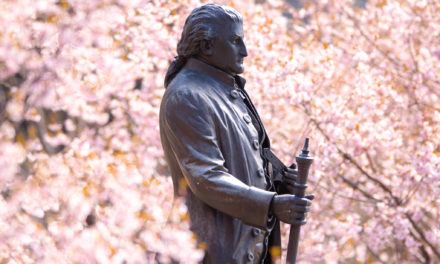The third week in May has played host to several significant events throughout the history of the United States and Northeast Ohio. These events, spanning groundbreaking achievements, social progress, and influential moments in politics, have left a lasting impact on the nation. We will delve into some of the most remarkable occurrences that took place during this week in U.S. and Cleveland history.
- The Dedication of the Free Stamp Sculpture (May 15, 1991)
On May 15, 1991, the iconic Free Stamp sculpture was officially dedicated in Willard Park, adjacent to Cleveland’s City Hall. Created by artists Claes Oldenburg and Coosje van Bruggen, this 50-foot-tall, 75-foot-long sculpture has become one of the city’s most recognizable landmarks. Representing a rubber stamp with the word “FREE” on its face, the artwork has been both celebrated and debated, reflecting the unique character and spirit of the city.
- The Opening of the Cleveland Aquarium (May 19, 1954)
On May 19, 1954, the Cleveland Aquarium opened its doors to the public. The aquarium, housed in the historic bathhouse at Gordon Park, aimed to educate visitors about the diverse aquatic life found in the Great Lakes and beyond. The aquarium operated for nearly four decades, captivating generations of Clevelanders with its engaging exhibits and live displays. Although the original facility closed in 1986, the Greater Cleveland Aquarium opened in 2012, continuing the city’s tradition of aquatic education and conservation.
- The Groundbreaking of the HealthLine (May 16, 2006)
The HealthLine, a bus rapid transit (BRT) system in Cleveland, held its groundbreaking ceremony on May 16, 2006. The innovative public transit project, which connects downtown Cleveland with University Circle, has since become a model for BRT systems across the country. The HealthLine has played a vital role in improving mobility for residents and visitors, while also promoting economic development along the Euclid Avenue corridor.
- The Cleveland Orchestra’s Centennial Celebration (May 20, 2018)
On May 20, 2018, the renowned Cleveland Orchestra commemorated its centennial with a special concert at Severance Hall. Founded in 1918, the orchestra has become one of the most respected ensembles in the world, earning accolades for its exceptional performances and commitment to music education. The centennial celebration was a testament to the orchestra’s enduring artistic excellence and its prominent role in Cleveland’s cultural landscape.
- The Tremont ArtWalk (May 21, 1993)
The Tremont ArtWalk, a beloved tradition in the historic Tremont neighborhood of Cleveland, began on May 21, 1993. The event, held on the second Friday of each month, showcases the work of local artists in galleries, shops, and other venues throughout the neighborhood. The Tremont ArtWalk has become a thriving community event, fostering an appreciation for the arts and supporting the growth of the city’s vibrant creative scene.
- The First Woman Appointed to the U.S. Cabinet (May 15, 1933)
On May 15, 1933, Frances Perkins was sworn in as the Secretary of Labor, making her the first woman appointed to a U.S. Cabinet position. Perkins served under President Franklin D. Roosevelt and played a pivotal role in the development of the New Deal, which sought to address the economic challenges of the Great Depression. Her groundbreaking appointment paved the way for future generations of women in leadership roles within the U.S. government.
- Charles Lindbergh Completes the First Solo Nonstop Transatlantic Flight (May 21, 1927)
On May 21, 1927, American aviator Charles Lindbergh completed the first solo nonstop transatlantic flight in history, flying from New York to Paris in his aircraft, the Spirit of St. Louis. Lindbergh’s daring feat captured the imagination of the world and advanced the field of aviation, inspiring a new era of air travel and exploration.
- The United States Congress Passes the Homestead Act (May 20, 1862)
On May 20, 1862, the United States Congress passed the Homestead Act, a landmark law that encouraged the settlement and development of the American West. The act granted 160 acres of public land to settlers for a nominal fee, provided they improved the land through cultivation and the construction of a dwelling. The Homestead Act played a critical role in the westward expansion of the United States and the shaping of the nation’s identity.
- The New York Stock Exchange Crash Triggers the Panic of 1792 (May 17, 1792)
The Panic of 1792, one of the earliest financial crises in American history, began on May 17, 1792, with the crash of the New York Stock Exchange. The panic, which was triggered by speculative trading and a lack of regulation, led to a severe economic depression that lasted for several months. The event highlighted the need for greater oversight and regulation of financial markets, ultimately contributing to the establishment of the U.S. Securities and Exchange Commission in 1934.
- The Signing of the Civil Rights Act of 1960 (May 20, 1960)
On May 20, 1960, President Dwight D. Eisenhower signed the Civil Rights Act of 1960 into law. This legislation sought to address issues related to voter suppression and discrimination, particularly in the American South. The act strengthened the enforcement of voting rights and laid the foundation for future civil rights legislation, such as the Civil Rights Act of 1964 and the Voting Rights Act of 1965.






